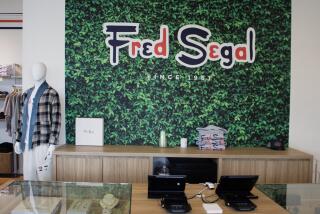L.L. Bean Takes Steps to Protect Itself in Stormy Catalog Market
- Share via
FREEPORT, Maine — Nobody needs to tell L.L. Bean’s top executive about competition this holiday season.
Leon Gorman, grandson of company founder Leon Leonwood Bean, had to look no further than his own mailbox one recent day.
“I got 16 catalogs in the mail, and I had only heard of one of them,” Gorman said.
Direct-mail retailers are flooding homes with more catalogs than ever this holiday season to cash in on predictions of strong sales and to beat a January postage increase. At the same time, more and more companies are jumping into the business.
“My forecast is that direct-mail retail sales this Christmas are going to be up 5%,” said Ken Gassman, an analyst at Davenport & Co. in Richmond, Va. “But because of the large number of catalogs out there, most catalog companies will be lucky to see flat sales.”
Despite being a mail-order pioneer with a loyal following, strong reputation and more than $1 billion in sales, L.L. Bean is not immune to the pressure. The company is reacting by launching a new line of clothing for women, opening more stores and making its catalogs more eye-catching.
The new Freeport Studio line for working women will be a departure from L.L. Bean’s traditional styles, which critics say lack flair.
Likewise, the planned opening of two more stores similar to the enormous flagship 24-hour store in Freeport, along with four to six smaller stores, marks a major change for a company that relies on mail-order sales for 90% of revenue.
The flagship store has 164,000 square feet on three floors. It has a trout pond inside, as well as an outdoor pond to let people try out a canoe, kayak or fly rod, weather permitting.
Next door is the new, 17,000-square-foot L.L. Bean Kids store. A year old, it too is open 24 hours and has a rock-climbing wall, interactive mountain bike test ride and test trails for hiking boots.
Gorman, the company’s president, likes to say L.L. Bean used to “sell the steak without the sizzle.” Now, he says, “we’ve got to sell the sizzle along with the steak.”
Something had to be done after sales, which had been growing at a 10% annual clip, trailed off in 1995, he said. At the same time, sales at the 16 L.L. Bean stores in Japan began suffering from the falling yen.
“We recognized the situation before it got too bad, before our backs were against the wall,” Gorman said.
L.L. Bean isn’t the only well-known mail-order company with problems. Lands’ End Inc. pushed out its chief executive and head of sales in October because of slumping sales and declining profits.
The problem is ever-increasing competition as Macy’s, Banana Republic and a host of smaller companies join the crowded catalog market. More companies also are carrying outdoor gear, traditionally an L.L. Bean stronghold.
Nationwide, 8,000 catalog companies are expected to mail about 14 billion catalogs this year, or 125 per household, said Bill Dean, president of W.A. Dean & Associates, a San Francisco firm that specializes in mail-order consulting and research.
Bean’s changes are designed to boost sales in a couple of ways.
The Freeport Studio line targets the “business casual” phenomenon that has swept the nation, said Fran Philip, who is in charge of the line. Bean invited fashion editors from magazines such as Mademoiselle, InStyle and First for Women to Freeport in November for a get-acquainted session.
The line should help revitalize Bean’s offerings, said Wendy Liebmann, president of WSL Strategic Retail in New York, which tracks consumer and retail trends. She said the traditional line has begun to look “sleepy.”
“That’s not to say the L.L. Bean name isn’t a good value in terms of good product, value for its money, good service,” Liebmann said. “It’s just gotten tired.”
The company hopes the new stores will boost brand identity while increasing sales of camping gear, fishing gear, bicycles, kayaks and canoes, things people want to see and handle before buying.
Six to eight stores will be built by 2001, most from Baltimore to Boston, where the company has a strong customer base, Gorman said. Bean would not disclose specific locations.
Both initiatives will help to decrease Bean’s over-reliance on the frenetic holiday season.
Research shows women tend to buy business clothes for themselves throughout the year. And retail stores can adjust to trends during the holidays more quickly than mail-order companies, said Larry Schulsinger of Management Ventures Inc. in Cambridge, Mass.
Even with the new strategy, Gorman said, L.L. Bean must be careful not to alienate its traditional customers. But, he said, his grandfather, who started the business in Freeport 86 years ago, would approve of the changes.
The original L.L. was a skilled marketer. He targeted customers for his Maine hunting boot using hunting license lists from the warden’s service. He launched his mail-order business in 1912, the year the U.S. Postal Service began parcel delivery.
“L.L. Bean was not the old-fashioned curmudgeon who didn’t like change,” Gorman said. “He was a progressive guy.”
More to Read
Inside the business of entertainment
The Wide Shot brings you news, analysis and insights on everything from streaming wars to production — and what it all means for the future.
You may occasionally receive promotional content from the Los Angeles Times.










